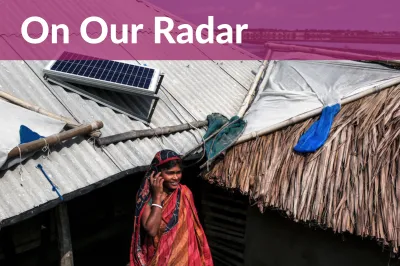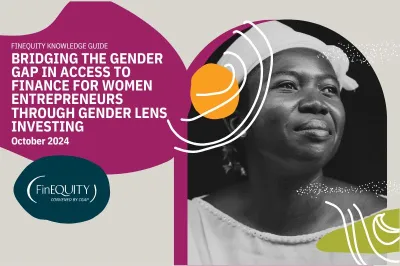Top Five Takeaways From the #FinEquity2023 Annual Meeting

With the FinEquity 2023 Annual Meeting just behind us, we are launching a series of blogs reflecting on the discussions that took place over the course of the two-day event. Our 2023 meeting focused on how financial inclusion can be a tool for both women’s economic empowerment and a just climate transition. To begin this series, here are my top five takeaways:
Across the globe, we are seeing the impacts of climate shocks intensify existing gender gaps. Women are facing food scarcity, displacement, and an increasing number of off-farm responsibilities. These challenges are then leading to greater risks of malnutrition and gender-based violence. Because women are the first victims of climate change, they must be consulted and play a central role in decision making. In her keynote address, Mrs. Graça Machel highlighted that we need to see women as drivers of social and economic transformation in every sphere of our society, and their role in a fair climate transition is no exception.
The nexus already exists for women. As Mrs. Graça Machel said, “the woman who is affected by climate is the woman who is affected by poverty is the woman who is affected by lack of resources of all nature”. We need to zero-in on this intersection to help financial service providers develop products and services that allow women to build resilience in the face of climate change, and to mitigate and adapt to climate challenges by creating productive livelihoods that are less vulnerable to shocks. During the event’s Member Share sessions, FinEquity members explained how offering things like bundling loans with non-financial services, using alternative credit scoring models for lending, and incentivizing uptake of index-based livestock insurance can improve climate resilience among rural women. As Nandini Harihareswara emphasized, when we are successful with these models, women are empowered to adapt with new, less climatically vulnerable livelihoods.
Shameran Abed, Executive Director of BRAC International, reminded participants that there is a strong demand for financial services that help women cope with and adapt to climate change. During parallel sessions, we heard about solar energy PAYGO and asset financing models that are empowering women to be resilient as they face climate adversity. We also heard from Christian Pennotti at CARE that 65% of their savings groups - predominately led by women - have continued to save and lend even as they face pandemic and climate-related crises.
Mary Ellen Iskenderian, the President and CEO of Women’s World Banking, reminded everyone that designing the right products for women’s needs in this space is both an existing gap and a critical need. Part of designing the right products involves ensuring we have the data needed to understand how women are being affected by climate projects and consulting with women and communities in the design process. Behavior change is also critical to accelerate adoption and use of these products after they are designed. Perspectives from different regions highlighted that improving women’s access to products will require a combination of closing the digital divide, increasing awareness of solutions, and eliminating financial and digital education gaps. These types of initiatives are key to ensure women’s comfort in navigating digital and financial systems, which Barbara Magnoni of EA Consultants emphasized is especially important in regions like Latin America and the Caribbean where women’s adoption of digital is still much lower than it is among men.
Women must be present at all levels of financial institutions – from agents to staff and leadership positions. We heard promising examples of several programs that are already focused on developing women to take on these roles across regions. In Africa, Shiphra Chisha from Graça Machel Trust shared that they are building a pipeline of women leaders within the financial services sector. In Asia, a large salesforce of women agents in India is showing exceptional results with more men and women alike signing up for products and maintaining higher savings balances. Ensuring that women are represented across the value chain, starting from the top down, will ensure better outcomes for all. Having more women in leadership positions leads to more diverse and innovative teams that yield greater financial performance.
These takeaways highlight the need to focus on the financial inclusion, women’s empowerment, and climate nexus as one of FinEquity’s priority topics. Stay tuned for Carolina Trivelli's upcoming blog on the launch of FinEquity’s global consultation to determine these priority areas, and please share your thoughts on our future direction as a community!


